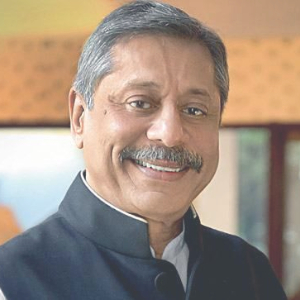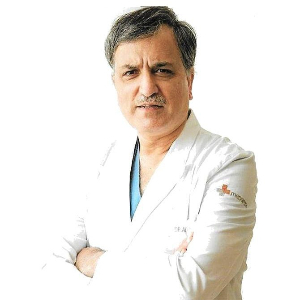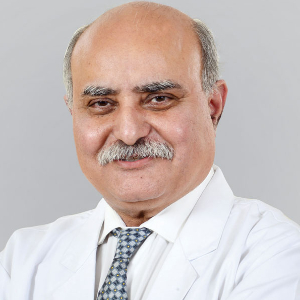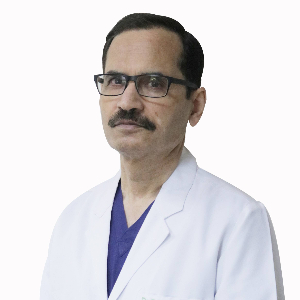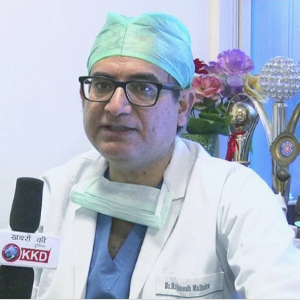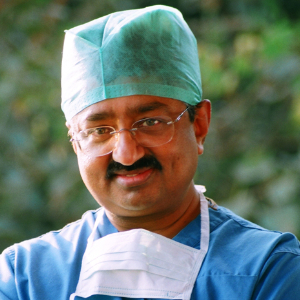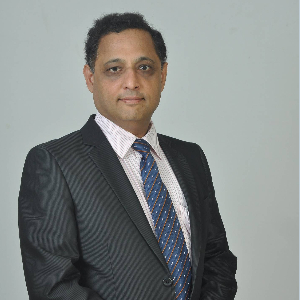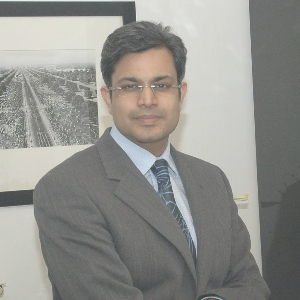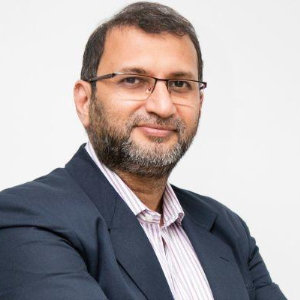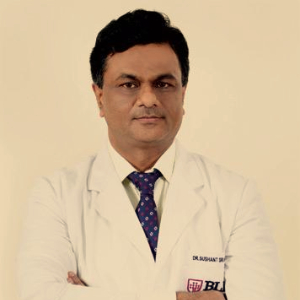Best Doctors for Aortic Aneurysm Surgery in India
- Cardiac Surgeon, Gurugram, India
- Over 40 years’ experience
- Medanta-The Medicity, Gurgaon
Profile Highlights:
- Dr. Naresh Trehan is one of the most highly skilled and globally recognized cardiothoracic and vascular surgeons.
- His experience encompasses 40+ years and is considered one of the most successful and accomplished cardiac surgeons in the country.
- Dr. Naresh Trehan specializes in cardiovascular surgery, cardiothoracic surgery, Heart Transplant, and Minimally Invasive Cardiac Surgery and has performed more than 48,000 successful open-heart surgeries to date.
- He started his career as a Cardiac Surgeon at New York University Medical Centre where he performed over 3000 coronary artery surgeries and returned to India in 1988 and founded the Escorts Heart Institute and Research Center in New Delhi.
- Dr. Trehan is the Founder Chairman of Medanta- The Medicity in Gurugram, a premier multi-specialty hospital with state-of-the-art infrastructure and equipped with the latest and advanced technologies.
- Cardio Thoracic & Vascular Surgeon, Gurugram, India
- Over 35 years’ experience
- Medanta-The Medicity, Gurgaon
Profile Highlights:
- Dr. Anil Bhan is an excellent Cardiovascular and thoracic surgeon who has performed more than 15,000 cardiac and vascular surgeries that include heart transplant surgery, aortic aneurysm surgery, pediatric cardiac surgery, valve repairs, and peripheral vascular surgery among several others.
- He is one of the best pediatric cardiac surgeons in Delhi/ NCR and is credited with performing heart bypass surgery on the youngest patient in India in 2007 (18 months).
- He performed the first extracorporeal membrane oxygenation (ECMO) and was the first to use a harmonic scalpel for harvesting radial mammary artery conduits in India in 2000 and 1995 respectively.
- Cardio Thoracic & Vascular Surgeon, Noida, India
- Over 38 years’ experience
- Fortis Hospital Noida
Profile Highlights:
- Dr. Ajay Kaul is a leading name in the field of Cardiothoracic and Vascular Surgery in India.
- He has over 3 decades of experience in performing cardiac surgeries and has done more than 25,000 cardiac operations till date.
- He specializes in Coronary Bypass surgery and is one of the best with the highest number of total arterial coronary bypass surgery (4000+) by using two internal mammary arteries from the chest and without any cuts on arms and legs.
- Dr. Ajay Kaul’s interest lies in complex congenital cardiac diseases in children, pediatric cardiac surgery, aneurysm surgery, valve repair surgery, and cardiac failure surgery.
- He is also an expert in minimally invasive cardiac surgeries (MICS) and has performed more than 5000 MICS which is the highest by any cardiac surgeon in India.
- Top Cardiac Surgeon | Fortis Escorts, New Delhi, India
- 35+ Years Experience
- Fortis Escorts Heart Institute New Delhi
Profile Highlights:
- Dr. Z. S. Meharwal is a highly esteemed and accomplished Cardiac Surgeon, serving as the Chairman and Head of Adult Cardiac Surgery at Fortis Okhla, where he leads the Cardiac Sciences and Adult Cardiothoracic and Vascular Surgery (CTVS) departments.
- With over 30 years of unparalleled experience, Dr. Meharwal has performed more than 30,000 cardiac surgeries, including some of the most complex heart operations and Left Ventricular Assist Device (LVAD) implantations.
- Dr. Meharwal holds prestigious degrees in medicine, including MBBS, MS, M.Ch, and MNAMS.
- Top Cardio Thoracic & Vascular Surgeon | Max Hospital, Saket, New Delhi, India
- 31+ Years Experience
- Max Super Specialty Hospital, Saket, New Delhi
Profile Highlights:
- Dr. Rajneesh Malhotra is a distinguished cardiovascular and thoracic surgeon in India with over 31 years of experience.
- He is a prominent leader in the field of Cardiac Sciences and Cardiac Surgery (CTVS).
- Currently serving as the Vice Chairman and Head of CTVS at Max Healthcare, Dr. Malhotra has a robust background in both traditional and advanced cardiac surgical techniques.
- Chief Cardiothoracic & Vascular Surgeon, Bangalore.
- Over 38 years’ experience
- Fortis Hospital Banerghatta Bengaluru
Profile Highlights:
- Dr. Vivek Jawali is a renowned Cardiothoracic and Vascular Surgeon in India and has performed more than 18,000 cardiothoracic and cardiovascular surgeries.
- He has several firsts to his credit that including the first beating heart bypass surgery in 1992 and the first Minimally Invasive Heart Bypass surgery in 1994 in India.
- He performed the first Awake Cardiac Surgery in 1999 which is done without general anesthesia or ventilator but under continuous high thoracic epidural. He also performed the first awake open heart surgery in the world without general anesthesia or ventilator on a 74-year-old patient for triple bypass with aortic valve replacement.
- Cardio-vascular and Thoracic Surgery & Heart Transplant, Mumbai Maharashtra
- Over 30 years’ experience
- Reliance Hospital Navi Mumbai
Profile Highlights:
- Dr. Anvay Mulay is a renowned Consultant Cardio-thoracic Surgeon at Sir H. N. Reliance Foundation Hospital, specializing in advanced Cardiovascular, Thoracic Surgery, and Heart Transplant.
- With over 30 years of global experience, he has a distinguished track record in leading-edge cardiac care.
- Dr. Anvay Mulay has worked at Leeds General Infirmary, Providence St Vincent Hospital, and Bristol Royal Infirmary.
- He holds an MBBS and MS from Grant Medical College, Mumbai, an MCh from the University of Mumbai, and completed his fellowship at St. Vincent’s Hospital, Oregon.
- Top Cardio Thoracic & Vascular Surgeon | Apollo Hospital, New Delhi, India
- 21+ years experience
- Indraprastha Apollo Hospital, New Delhi
Profile Highlights:
- Dr. Mukesh Goel is a distinguished Cardiothoracic and Vascular Surgeon with an impressive 21 years of experience in the field.
- Currently affiliated with Apollo Hospitals Indraprastha in New Delhi, Dr. Goel is renowned for his expertise in managing complex cardiac and vascular conditions.
- His extensive qualifications include an MBBS, MS, and MCh, which equip him with the comprehensive knowledge required to handle a diverse range of cardiovascular and thoracic disorders.
- Cardiac Surgeon, Mumbai, India
- Over 24 years’ experience
Profile Highlights:
- Dr. Zainulabedin Hamdulay is one of the best cardiac surgeons in Mumbai, India, and specializes in devising new and innovative techniques for cardiac surgeries.
- He has 24+ years of experience and has performed over 8000 cardiac surgeries that included complex valve repairs, congenital cardiac surgery, CABG, and several minimally invasive cardiac surgeries.
- With a motive to provide the best, affordable and comprehensive cardiac care to all his patients, he founded the Hamdulay Heart Foundation to provide aid to the economically backward community.
- Chairperson Heart & Lungs Transplant, New Delhi, India
- Over 20 years’ experience
- Artemis Hospital, Gurgaon
Profile Highlights:
- Dr. Sushant Srivastava is a highly respected Cardio-Vascular Surgeon with a distinguished career spanning over two decades.
- He is currently the Chairperson for Heart & Lungs Transplant at Artemis Hospitals, Gurugram.
- An expert in Cardio Thoracic and Vascular Surgery, Dr. Srivastava has performed over 10,000 surgeries, making significant contributions to the field with his expertise in complex procedures.
Best Hospitals for Aortic Aneurysm Surgery in India
- City: New Delhi, India
Hospital Highlights:
- Over the last 33 years, the Fortis Escorts Heart Institute has set new standards in cardiac treatment with groundbreaking research. It is now known around the world as a centre of expertise for Cardiac Bypass Surgery, Interventional Cardiology, Non-invasive Cardiology, Paediatric Cardiology, and Paediatric Cardiac Surgery.
- The hospital has cutting-edge laboratories that perform a wide range of diagnostic tests in Nuclear Medicine, Radiology, Biochemistry, Haematology, Transfusion Medicine, and Microbiology.
- Fortis Escorts Heart Institute boasts a diverse group of bright and experienced doctors who are backed up by a team of highly qualified, experienced, and devoted support professionals as well as cutting-edge equipment such as the recently installed Dual CT Scan.
- Approximately 200 cardiac doctors and 1600 personnel currently collaborate to manage over 14,500 admissions and 7,200 emergency situations each year. The hospital now has a 310-bed infrastructure, as well as five cath labs and a slew of other world-class amenities.
- City: Faridabad
Hospital Highlights:
In the sprawling city of Faridabad, where healthcare needs are diverse and ever-evolving, one institution has consistently stood out as a beacon of excellence in the field of medicine—Marengo Asia Hospital. Established with a vision to provide world-class healthcare services to the community it serves, Marengo Asia Hospital has emerged as a trusted name synonymous with quality, compassion, and innovation in healthcare.
- City: New Delhi, India
Hospital Highlights:
- Equipped with 650 beds, BLK-Max Super Speciality Hospital is the largest stand-alone private sector hospital in Delhi.
- With over 1500 healthcare providers and 150 globally renowned super specialists, the hospital is one of Asia’s largest BMT Centres. The hospital is known for having some of the best cancer doctors in the country.
- The hospital is NABH and NABL accredited and was inaugurated by the first Prime Minister of India. Pt. Jawahar Lal Nehru.
- City: Chennai, India
Hospital Highlights:
- Located in Chennai, India, MGM Healthcare is a top multispecialty hospital that provides all medical services under one roof.
- Since its founding in 2019, MGM Healthcare has quickly become a leading national referral centre, creating several innovative flagship initiatives.
- MGM Healthcare combines next-generation medical and digital technologies to provide better patient results.
- With 12 centres of excellence, more than 400 inpatient beds, 100 intensive care unit beds, and 24/7 emergency care, MGM Healthcare leaves no chance in redefining the patient experience in Chennai.
- MGM Healthcare boasts 250+ expert doctors across 30+ departments, including Cardiology, Pulmonology, Neurology, Obstetrics & Gynaecology, and more.
- They house 12 specialized Centres of Excellence, including Neurosciences, Orthopaedics, and Multi-Organ Transplantation.
- Their team of doctors, nurses, and paramedics works together to give every patient individualized treatment.
- City: Noida, India
Hospital Highlights:
- Fortis Hospital, Noida, stands as one of the oldest and most trusted healthcare institutions in the region, setting a benchmark for comprehensive medical care.
- As the second mega hub hospital in the Fortis Healthcare Group, Fortis Hospital, Noida, upholds a legacy of trust among more than 1.2 million patients. By integrating top-tier professionals with cutting-edge technology, the hospital delivers superior treatment across various medical disciplines.
- Specializing in advanced Neurosciences, Orthopedics, Kidney and Liver Transplant Programmes, Fortis Hospital, Noida has successfully performed over 1,500 transplants, solidifying its reputation as a leader in specialized medical interventions.
Abdominal Aortic Aneurysm (AAA)
Abdominal Aortic Aneurysm (AAA) is the inflammation or swelling of the aorta which is the largest artery of the body. Large aneurysms are rare but are fatal if they burst. It runs from the heart to the abdomen through the chest and is the largest vessel in the human body. A rupture of the AAA can cause bleeding that may be life-threatening.
Types of Abdominal Aortic Aneurysm
The size and the speed of growth of an Aneurysm are the key factors for the classification.
- Small (<5.5 cm): These are slow-growing Abdominal Aortic Aneurysms with a comparatively lesser risk of rupturing than the larger aneurysms. Regular abdominal ultrasounds are often helpful in monitoring these aneurysms.
- Large (>5.5 cm): These are fast-growing Abdominal Aortic Aneurysms that have high chances of rupturing. There might be internal bleeding due to rupture followed by other major complications. The larger the size of the aneurysm, the higher the chances of treating the same through the surgery.
Symptoms of Abdominal Aortic Aneurysm
In most cases, a small abdominal aortic aneurysm shows no symptoms. However, a larger AAA may cause pain or a pulsating feeling in the abdomen & persistent back pain. As it grows slowly without showing any visible symptoms, it is often difficult to detect an Abdominal Aortic Aneurysm. While some aneurysms stay small without any rupture, many others grow large.
They may notice a few symptoms if they have an Abdominal Aortic Aneurysm that continues to enlarge. These symptoms may include back pain, deep and persistent pain in the abdomen, and a pulsating feel near the belly button. It also includes clammy skin, nausea, shock, and vomiting.
A ruptured abdominal aortic aneurysm may cause:
- Dizziness
- Sweaty skin
- Rapid heartbeat
- Shortness of breath
- Loss of consciousness
Causes & risk factors of Abdominal Aortic Aneurysm
- Age: Increasing age is a risk factor for abdominal aortic aneurysms.
- Gender: AAAs are most common in men aged over 65.
- Smoking: Tobacco contains substances that damage the aortic wall.
- Atherosclerosis: In atherosclerosis, there is the narrowing of the arteries due to the accumulation of plaque. These plaques cause the widening of the aorta so that the blood keeps on flowing leading to the weakening of the aorta.
- High blood pressure: It increases the pressure on aortic walls. This may weaken the walls of the aorta and cause damage to the same.
- Family history: Having a family history of AAA may increase the risk of developing it.
- Infection in the aorta: A fungal or bacterial infection may cause an Abdominal Aortic Aneurysm.
- Blood vessel diseases: Some diseases may cause inflammation in the blood vessels.
- Trauma: An injury or trauma may also cause an Abdominal Aortic Aneurysm.
Risk factors for Abdominal Aortic Aneurysm
- Family history: If you have a family history of an Abdominal Aortic Aneurysm, you are at an increased risk of developing the condition.
- Tobacco use: Tobacco consumption can increase your chances of developing an Abdominal Aortic Aneurysm.
- Color complexion: People with white or fair color complexion have a risk of developing abdominal aortic aneurysms.
- Other types of aneurysm: If you have an aneurysm in some other blood vessel, it may increase your risk for Abdominal Aortic Aneurysm.
Diagnosis of Abdominal Aortic Aneurysm
Routine physical examination
Abdominal MRI
Ultrasound
Abdominal CT scan
Treatment options for Abdominal Aortic Aneurysm
Medical monitoring
Treatment of Large AAA
Endovascular surgery
During endovascular surgery, a small incision is made in the groin through which a graft made of metal mesh is inserted & advanced to the swollen aorta. This graft is sealed to the aortic wall at both ends which reduces the risk of bursting.
Open surgery
Treatment of small or medium AAA
For a small (3.0-4.4cm) or medium (4.5-5.4cm) aneurysm, surgery may not be recommended as it may not benefit the patient. The patient is called for regular check-ups (every year in case of a small aneurysm and every three months in case of a medium aneurysm) & scans to monitor the size of the aneurysm.
The patient is advised to prevent the aneurysm from getting bigger, which is done by:
- Stopping smoking
- Eating a balanced diet
- Maintaining a healthy weight
- Regular exercise
Complications of Abdominal Aortic Aneurysm
A ruptured aneurysm or aortic dissection (or tear) in the layers of the Aortic wall are the major complications. The larger the size and speed of growth of the aneurysm, the higher are the chances of Aneurysm rupture which may cause bleeding, which is life-threatening.
You will realize a ruptured aneurysm if you have low blood pressure, sudden and continuous abdominal pain, or a faster pulse. A tearing sensation or back pain also signifies the rupture of an aneurysm.
Prevention Of Abdominal Aortic Aneurysm
There are various ways of preventing and worsening Abdominal Aortic Aneurysm. These, does not limit to but, may include:
- Quitting the consumption of tobacco and smoking may help prevent aneurysms.
- Maintain normal blood pressure and cholesterol by following the instructions of the doctor.
- Eating a healthy and balanced diet that includes fruits and vegetables is also helpful.
- Exercising regularly with the right activities advised by the doctor may also help prevent aneurysms.

